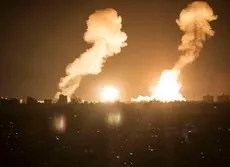Why Are Arab Nations Condemning Israeli Attacks on Iran?

Synopsis
Key Takeaways
- Arab nations unite in condemning Israel's military actions against Iran.
- Saudi Arabia emphasizes the violation of international laws.
- The UAE calls for self-restraint and dialogue.
- Kuwait urges the international community to act.
- Jordan warns of rising tensions threatening regional stability.
Riyadh, June 13 (NationPress) Numerous Arab nations expressed their strong denunciation of Israel's recent assault on Iran, which occurred early on Friday. This aggressive act has notably heightened tensions in the region and raises concerns about the potential for a wider conflict between these long-standing adversaries.
The Kingdom of Saudi Arabia issued a statement through its Ministry of Foreign Affairs, asserting, "The Kingdom firmly condemns and denounces the blatant Israeli aggressions against the brotherly Islamic Republic of Iran, which undermine its sovereignty and security, constituting a clear violation of international laws and norms. While condemning these heinous attacks, the Kingdom emphasizes that the international community and the Security Council bear a significant responsibility to immediately halt this aggression."
The attacks arise amid growing worries regarding Tehran’s nuclear program and its perceived threat to Israel's national security.
In a televised address, Israeli Prime Minister Benjamin Netanyahu confirmed that Israel had embarked on a "targeted military operation to neutralize the Iranian threat to Israel’s very existence."
The United Arab Emirates (UAE) Ministry of Foreign Affairs (MoFA) underscored the necessity for utmost self-restraint and sound judgment to reduce risks and avert an escalation of the conflict.
"The United Arab Emirates has condemned in the strongest terms Israel’s military actions against the Islamic Republic of Iran and expressed grave concern regarding the ongoing escalation and its implications for regional security and stability," the statement read.
The Ministry reiterated the UAE’s stance that enhancing dialogue, adhering to international law, and respecting states' sovereignty are essential principles for resolving current crises. The UAE called upon the United Nations Security Council to take urgent measures to achieve a ceasefire and bolster international peace and security.
Kuwait’s Ministry of Foreign Affairs urged the global community to assume responsibility in halting these violations to maintain security and stability in the region.
"The Ministry of Foreign Affairs expresses the State of Kuwait's strong condemnation of the Israeli attacks on the Islamic Republic of Iran, which constitute a flagrant violation of all international laws and conventions, a blatant assault on Iranian sovereignty, and a threat to the region's security and stability. The State of Kuwait reiterates its call for the international community, particularly the Security Council, to take responsibility in halting these violations in a manner that preserves regional security and stability," the Ministry stated.
Condemning the attack, Jordan’s Ministry of Foreign Affairs warned that escalating tensions jeopardize the region's security and stability.
"The Hashemite Kingdom of Jordan strongly condemned the Israeli aggression against the Islamic Republic of Iran, labeling it a blatant violation of the sovereignty of a United Nations member state and a clear infringement of international law and the United Nations Charter," the Jordan Foreign Ministry stated.
"The official spokesperson for the Ministry of Foreign Affairs and Expatriates, Ambassador Sufian Al-Qudah, cautioned against the repercussions of such escalating violations, which threaten the region's security and stability. Al-Qudah reiterated the need to respect international law and the responsibility of the international community—especially the UN Security Council—to take urgent action to stop these aggressions, prevent their recurrence, and reach solutions that avoid further tension and escalation," it concluded.









